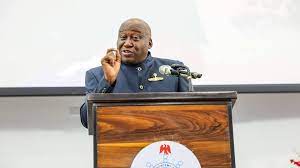 Despite growing concerns with regards to employment of seafarers, the Maritime Academy of Nigeria (MAN) Oron has revealed that it has trained over 24,000 seafarers between 2017 and 2022.
Despite growing concerns with regards to employment of seafarers, the Maritime Academy of Nigeria (MAN) Oron has revealed that it has trained over 24,000 seafarers between 2017 and 2022.
The Rector of MAN Oron, Commodore Duja Effedua (Rtd), stated this recently while speaking with newsmen on the sidelines of the Marine & Blue Economy Ministry’s Stakeholders’ Roundtable Engagement on Advancing Sustainable Development in Nigeria’s maritime sector.
According to the Rector, 2098 additional seafarers, including foreign students have already concluded their training programme at the Academy in the year 2023.
Effedua, however, expressed concern at the limited opportunities for employment for the thousands of skilled manpower trained by the Academy.
His words: “From 2017 to 2022, the Academy trained over 24,000 seafarers. About 2098 have been trained in 2023 alone and the numbers are still increasing. For admissions into the Academy in 2024, we are already oversubscribed. The concern is where are these seafarers going to work? They have to get opportunities and the Ministry should be fighting to ensure that Nigerians replace the foreigners operating in the sector.”
While observing that the nation’s Cabotage regime is still struggling, he expressed optimism that MAN Oron-trained seafarers will ensure Nigeria no longer needs to depend on foreigners for seafaring.
“The Marine and Blue Economy may end up being the largest Ministry in Nigeria because it cuts across several ministries even up to tourism.
MAN Oron has been playing a crucial role in capacity building for the industry, but with the establishment of the Blue Economy Ministry we intend to explore and exploit the new opportunities.
“Presently, we are recalibrating to enable us plug into the Blue Economy which is relatively new to everyone at the moment. But the onus is on all stakeholders to do our best to create opportunities for indigenous seafarers,” Effedua remarked.
Speaking on the menace of Illegal Unreported Unregulated (IUU) fishing, the Rector suggested that a legal framework should be developed to address the challenge in Nigeria.
Effedua also observed that most vessels involved in IUU fishing are factory vessels that quickly process the fishes poached on Nigerian waters before taking them to seaports in neighbouring countries and eventually selling the products to Nigerians.
*Tribune















